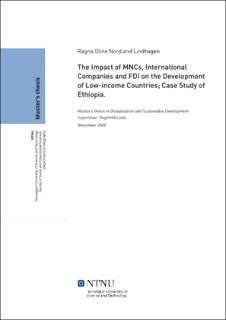| dc.contributor.advisor | Lund, Ragnhild | |
| dc.contributor.author | Lindhagen, Ragna Oline Nordland | |
| dc.date.accessioned | 2021-09-28T17:55:11Z | |
| dc.date.available | 2021-09-28T17:55:11Z | |
| dc.date.issued | 2020 | |
| dc.identifier | no.ntnu:inspera:66377746:24097560 | |
| dc.identifier.uri | https://hdl.handle.net/11250/2785204 | |
| dc.description.abstract | Det er en lang diskusjon om multinasjonale selskaper (MNS) og deres utenlandske innvirkning på lavinntektsland, men med denne oppgaven ønsker jeg å forstå nøyaktig hvordan og om utenlandske investorer og selskaper kan hjelpe i utviklingen av disse lavinntektslandene, spesielt via å se innvirkningen deres på Etiopia. Denne artikkelen ser på utenlandske direkteinvesteringer (FDI), Etiopia i sin helhet og deres utenlandske investeringspolitikk, samt å se på fem utenlandske selskaper som opererer i Etiopia for å forstå effekten MNS og internasjonale selskaper har på et lavinntektsland som Etiopia. For studiet har jeg intervjuet fem utenlandske selskaper i Etiopia og en kilde i Etiopisk investeringskommisjon, i tillegg til å se på meningene til forskere og kjente organisasjoner, som Verdensbanken og UNDPs, syn på utvikling og FDI. Det som er klart gjennom denne oppgaven, er at det er en klar sammenheng mellom utviklingsfaktorer og bidragsytere, og hva utenlandske selskaper bringer med seg og hvordan de påvirker Etiopia. Videre hjelper landets konsentrasjon på å skaffe seg direkteinvesteringer og fremme seg selv som et flott sted for investeringer gjennom skattefritak og politiske retningslinjer ment for å fremme utenlandsk investering, bidrar til å skape det grunnlaget som er nødvendig for at utenlandske selskaper og investorer ikke bare skal lykkes selv, men for at landet Etiopia skal kunne utvikle seg gjennom denne prosessen. Til tross for at Etiopia ikke har et stabilt klima både politisk og geografisk, er landet vellykket med å få FDI-er og er Øst-Afrikas mest attraktive FDI land, og fortsette deres til nå vellykkete utvikling. | |
| dc.description.abstract | There is a long discussion regarding Multinational Corporations (MNCs) and foreign impact on low-income countries, but with this thesis I wish to understand exactly how and if foreign investors and companies can aid in the development of these low-income countries, specifically through seeing the impact on Ethiopia. This paper looks at Foreign Direct Investment (FDI), Ethiopia as a whole and their foreign investment policies, as well as looking at five foreign companies that operate in Ethiopia to understand the impact MNCs and International Companies have on a low-income country such as Ethiopia. For the study, I’ve interviewed five foreign companies in Ethiopia and a source in the Ethiopian Investment Commission, as well as looking at researchers’ and known organisations, such as the World Bank and the UNDP’s, view on development and FDI. What is clear through this thesis, is that there is a clear correlation between the development factors and contributors and what foreign companies bring with them and how they affect Ethiopia. Furthermore, the country’s concentration on gaining FDI and promoting themselves as a great place for investment through tax exemption and policies that are meant to promote FDI, helps create the basis that is needed for foreign companies and investors to not only succeed themselves, but for the country to gain development through them. Despite not having a stable climate both politically and geographically, the country is successful with gaining FDI’s and remain East Africa’s highest FDI country, and continuing their streak of development. | |
| dc.language | | |
| dc.publisher | NTNU | |
| dc.title | The Impact of MNCs, International Companies and FDI on the Development of Low-income Countries; Case Study of Ethiopia. | |
| dc.type | Master thesis | |
